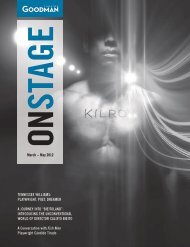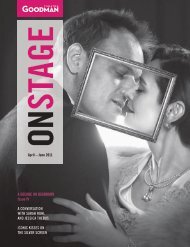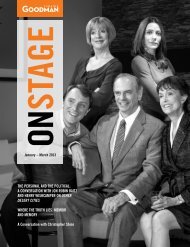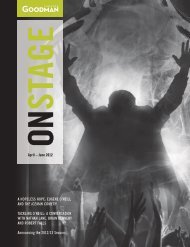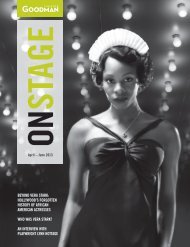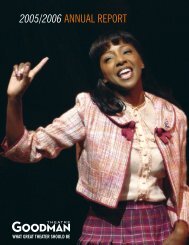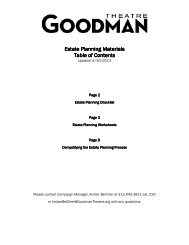Magnolia, atlanta and dr. Martin luther king jr. a ... - Goodman Theatre
Magnolia, atlanta and dr. Martin luther king jr. a ... - Goodman Theatre
Magnolia, atlanta and dr. Martin luther king jr. a ... - Goodman Theatre
Create successful ePaper yourself
Turn your PDF publications into a flip-book with our unique Google optimized e-Paper software.
IN THE ALBERT<br />
LEFT: Photo of Atlanta Mayor Ivan Allen Jr. <strong>and</strong> actress<br />
Olivia de Havill<strong>and</strong> in a parade on Peachtree Street in<br />
Atlanta, Georgia, celebrating the re-release of the motion<br />
picture Gone with the Wind. Courtesy of the Atlanta<br />
History Center, Joe McTyre Collection. OPPOSITE: Photo<br />
of a line of mourners during the funeral procession for Dr.<br />
<strong>Martin</strong> Luther King Jr. in Atlanta, Georgia. Courtesy of the<br />
Atlanta History Center, Floyd Jillson Collection.<br />
a successful black real estate developer,<br />
explains it this way: “Got my own colored<br />
doctor, policeman, got Herndon for my<br />
banker—I don’t need to sleep let alone<br />
pee next to no white folk. Everything I<br />
need I got, right here in Sweet Auburn.”<br />
William, a white restaurant owner who<br />
has recently desegregated his restaurant,<br />
explains it like this: “Colored protest<br />
is bad for business. Atlanta’s no Little<br />
Rock…Myself, I’ll never <strong>dr</strong>ink from the<br />
same fountain as a Negro.”<br />
As the late 1950s <strong>and</strong> early 1960s<br />
brought a tidal wave of change to the<br />
established order in the South, Atlanta<br />
promoted itself as “the city too busy<br />
to hate.” Following the 1954 Brown v.<br />
Board of Education of Topeka, Kansas,<br />
decision, Washington pressured southern<br />
cities to integrate their schools. Little<br />
Rock, Arkansas, went first—<strong>and</strong> when<br />
nine black students were admitted to <strong>and</strong><br />
attempted to enter Central High School,<br />
the city erupted in violence that persisted<br />
until President Eisenhower dispatched<br />
the 101st Airborne Division to restore<br />
order. When it came time for Atlanta to<br />
integrate, Mayor William B. Hartsfield<br />
vowed that “what happened in Little<br />
Rock won’t happen here.” On August<br />
30, 1961, nine chil<strong>dr</strong>en were peacefully<br />
integrated into four Atlanta high schools.<br />
Civic leaders boasted that it was “the<br />
silence heard around the world.”<br />
Though <strong>Martin</strong> Luther King Jr. initially<br />
resisted following in his father’s footsteps,<br />
he decided to enter the ministry<br />
during his senior year at Atlanta’s<br />
Morehouse College. He studied first at<br />
Crozer Theological Seminary in Chester,<br />
Pennsylvania, <strong>and</strong> then received a doctorate<br />
at Boston University, where he<br />
met <strong>and</strong> married Coretta Scott. After<br />
graduation, he <strong>and</strong> Coretta traveled<br />
south to Montgomery, Alabama, where<br />
King served as the pastor at Dexter<br />
Avenue Baptist Church. It was during<br />
King’s five years in Montgomery that he<br />
was catapulted to international fame for<br />
his role in the burgeoning Civil Rights<br />
Movement, beginning with his leadership<br />
during the Montgomery bus boycott.<br />
In 1959, King moved back to Atlanta<br />
where he established the Southern<br />
Christian Leadership Conference headquartered<br />
on Auburn Avenue <strong>and</strong> joined<br />
his father as co-pastor of Ebenezer<br />
Baptist Church.<br />
By 1963, the year in which <strong>Magnolia</strong><br />
is set, civic leaders were struggling to<br />
maintain Atlanta’s image as “the city<br />
too busy to hate,” but the strain was<br />
starting to show.<br />
By 1963, the year in which <strong>Magnolia</strong><br />
is set, civic leaders were struggling<br />
to maintain Atlanta’s image as “the<br />
city too busy to hate,” but the strain<br />
was starting to show. In 1960, King<br />
participated in a sit-in to protest segregation<br />
at Rich’s Department Store in<br />
downtown Atlanta. He was arrested <strong>and</strong><br />
sentenced to four months in Reidsville<br />
Penitentiary. In 1961, Ivan Allen Jr.,<br />
member of a prominent white Atlanta<br />
family <strong>and</strong> president of the Atlanta<br />
4





